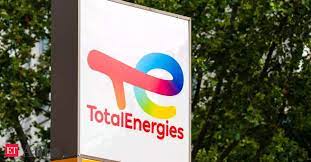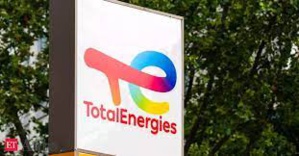According to data gathered by Reuters, the French energy giant TotalEnergies has surpassed rivals Shell and BP in the race to establish a renewables business.
Even so, investors are still being cautious for the time being, as evidenced by the fact that shares of the three European behemoths have lagged behind their oil and gas-focused American rivals Exxon Mobil and Chevron so far this year.
Even after the business reported a record profit in the third quarter of 2022 thanks to its successful oil and gas operations and almost zero debt, TotalEnergie's shares have significantly underperformed those of its British competitors.
In an effort to reduce greenhouse gas emissions to zero, BP, Shell, and TotalEnergies have all laid out ambitious plans to switch to low-carbon and renewable energies in the ensuing decades.
They intend to increase investments in low-carbon in the coming years, even though their spending is still primarily directed toward oil and gas.
According to company data, TotalEnergies had 7.4 GW of net installed renewable energy capacity as of the end of September. This was the result of investments like a $2 billion partnership with the Adani Group of India last year and the purchase of a 50% stake in Clearway, one of the biggest U.S. renewable energy companies.
In contrast, BP has built 2GW of operational renewable energy capacity, in part thanks to its 50% ownership of Lightsource BP, one of the biggest solar energy companies in the world.
With earlier this year's purchases of Indian renewables platform Sprng Energy and US producer Savion, Shell's net capacity is slightly higher at 2.2GW.
The pipeline of projects currently under construction or approved for development for the three companies, totaling 45.2 GW for TotalEnergies, 26.9 GW for BP, and 5.2 GW for Shell, tells a similar tale.
By 2030, TotalEnergies wants to have 100GW of gross renewable energy capacity, whereas BP wants to have 50GW of net renewable energy. Shell does not have a specific capacity goal, but it does plan to exchange 530 terawatt hours of electricity during that time.
By the end of this year, TotalEnergies may be net debt-free, giving it more freedom to invest and make acquisitions. TotalEnergies has also reduced its debt more quickly than its two competitors.
The increasing investments in renewable energy haven't yet convinced investors, and credit rating agency Moody's also sounded a cautious note, warning that the change would put the businesses in direct competition with utilities for projects that produce lower returns than conventional oil and gas investments.
"The ability of BP, Shell and TotalEnergies to enhance returns through optimising ownership, the funding mix, marketing and integration into their overall offerings will be key to the total returns achieved," Moody's said in a note.
The three companies' investments in infrastructure and projects ranging from hydrogen to electric vehicle charging were also mentioned in the report, which stated that the profitability would likely not be known for many years.
(Source:www.reuters.com)
Even so, investors are still being cautious for the time being, as evidenced by the fact that shares of the three European behemoths have lagged behind their oil and gas-focused American rivals Exxon Mobil and Chevron so far this year.
Even after the business reported a record profit in the third quarter of 2022 thanks to its successful oil and gas operations and almost zero debt, TotalEnergie's shares have significantly underperformed those of its British competitors.
In an effort to reduce greenhouse gas emissions to zero, BP, Shell, and TotalEnergies have all laid out ambitious plans to switch to low-carbon and renewable energies in the ensuing decades.
They intend to increase investments in low-carbon in the coming years, even though their spending is still primarily directed toward oil and gas.
According to company data, TotalEnergies had 7.4 GW of net installed renewable energy capacity as of the end of September. This was the result of investments like a $2 billion partnership with the Adani Group of India last year and the purchase of a 50% stake in Clearway, one of the biggest U.S. renewable energy companies.
In contrast, BP has built 2GW of operational renewable energy capacity, in part thanks to its 50% ownership of Lightsource BP, one of the biggest solar energy companies in the world.
With earlier this year's purchases of Indian renewables platform Sprng Energy and US producer Savion, Shell's net capacity is slightly higher at 2.2GW.
The pipeline of projects currently under construction or approved for development for the three companies, totaling 45.2 GW for TotalEnergies, 26.9 GW for BP, and 5.2 GW for Shell, tells a similar tale.
By 2030, TotalEnergies wants to have 100GW of gross renewable energy capacity, whereas BP wants to have 50GW of net renewable energy. Shell does not have a specific capacity goal, but it does plan to exchange 530 terawatt hours of electricity during that time.
By the end of this year, TotalEnergies may be net debt-free, giving it more freedom to invest and make acquisitions. TotalEnergies has also reduced its debt more quickly than its two competitors.
The increasing investments in renewable energy haven't yet convinced investors, and credit rating agency Moody's also sounded a cautious note, warning that the change would put the businesses in direct competition with utilities for projects that produce lower returns than conventional oil and gas investments.
"The ability of BP, Shell and TotalEnergies to enhance returns through optimising ownership, the funding mix, marketing and integration into their overall offerings will be key to the total returns achieved," Moody's said in a note.
The three companies' investments in infrastructure and projects ranging from hydrogen to electric vehicle charging were also mentioned in the report, which stated that the profitability would likely not be known for many years.
(Source:www.reuters.com)






